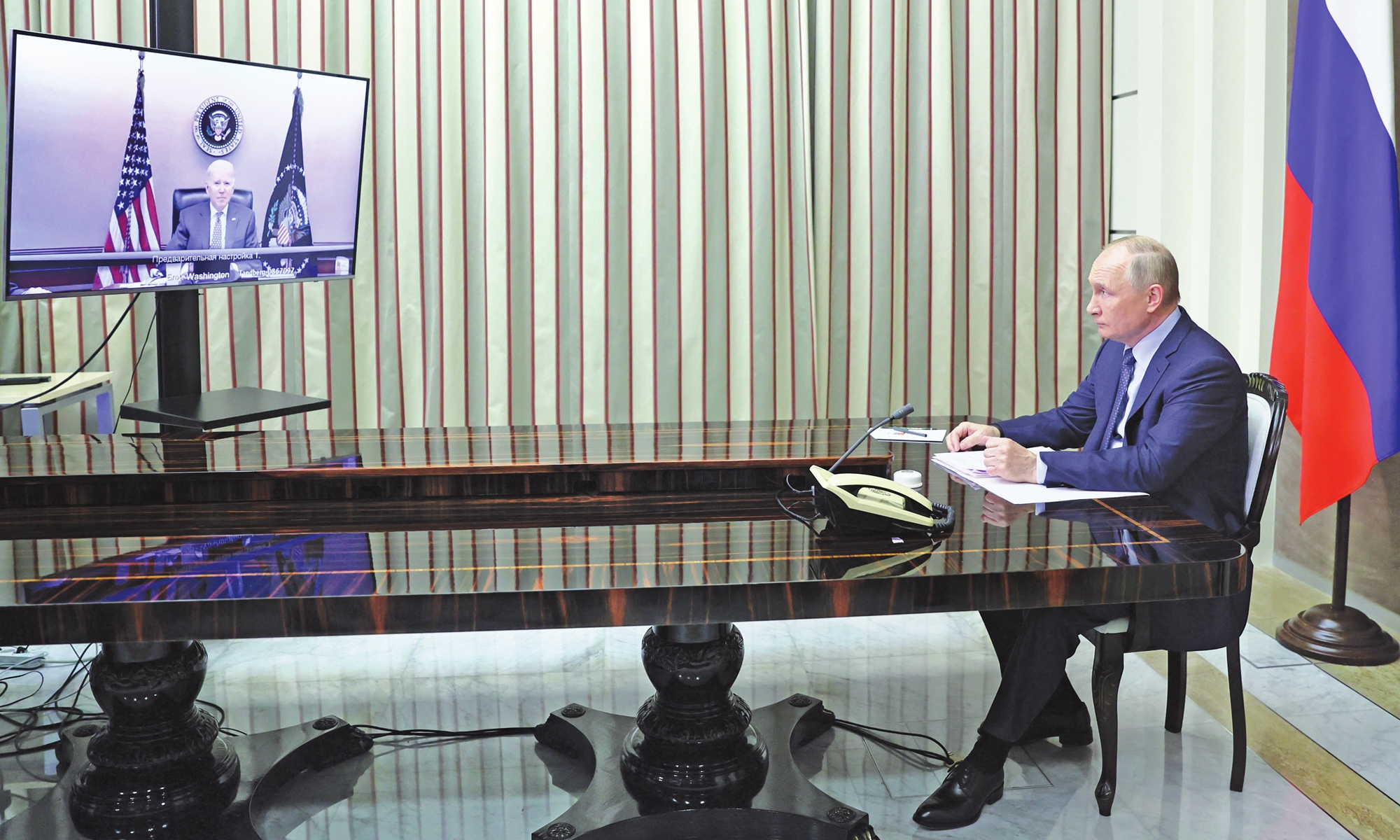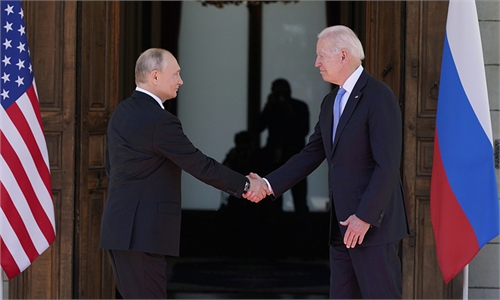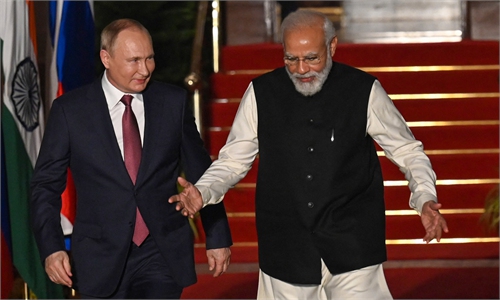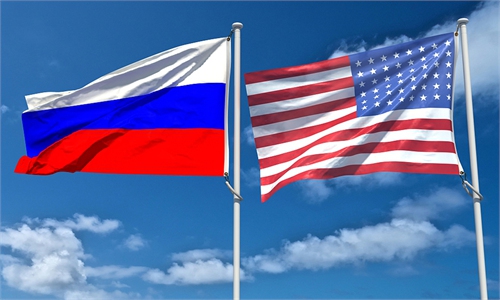
Russian President Vladimir Putin attends a meeting with US President Joe Biden via a video call in the Black Sea resort of Sochi on December 7, 2021. Photo: AFP
In what analysts described as a "candid and tough-toned" video meeting between Russian President Vladimir Putin and US President Joe Biden, it ended with a US caveat of Russia on the Ukraine issue. Analysts warned that the US should be cautious of turning those threats into action, as Russia is unlikely to concede over this core-interest issue that threatens its national security, and that any provocative move from Washington and its NATO allies will eventually backfire.
Faced with the US crackdown, the bond between China and Russia has grown stronger than ever, as the two countries unwaveringly support each other on many fronts, said experts. They said that such a "support of each other's core interests" embodies true friendship, which defies the US Cold War mentality, unilateralism and selfishness.
During a two-hour video call, Biden told the Russian leader that the US would send defensive materiel to Ukraine "above and beyond" what the US already has sent if Russia invades, National Security Advisor Jake Sullivan told reporters. Biden also threatened "strong economic measures" in case of an attack, Bloomberg reported.
Putin pushed back, blaming NATO for the increase in tensions through its "dangerous efforts" to expand ties with Kyiv and ratchet up its military potential on Russia's borders, the Kremlin said in a statement that described the talks as "frank and businesslike," according to the report.
The Russian president reiterated that Moscow wants binding security guarantees that the US-led alliance won't take in new members to the east or station offensive weapons close to Russia, said the report.
The virtual meeting between Biden and Putin was their fourth this year, including a face-to-face meeting in Geneva.
Analysts said that this meeting attracted wide attention, but was not expected to yield concrete results as the divergence between the two countries over core-interest issues, such as the Ukraine crisis and Iran is too deep to be fixed during the meeting.
As on the Ukraine question, the two sides drew redlines for each other, and there's no sign of playing down the question, Yang Jin, an associate research fellow at the Institute of Russian, Eastern European and Central Asian Studies under the Chinese Academy of Social Sciences, told the Global Times, noting that "Washington reiterated its stance of safeguarding the security interests of its NATO partners while ensuring weapons supplies to Ukraine," he said, explaining that all these pledges are the redlines of Kremlin.
Yet for Russia, NATO's expansion to the east or Ukraine's NATO bid poses a severe threat to Russia's national security, said Yang, noting that Russia is unlikely to make any concession on the Ukraine question. "We could not exclude the possibility that Russia would take tougher measures in ensuring its national security and regional security, and a fierce struggle between the US and Russia is expected to continue," he said.
The Wall Street Journal reported in January that NATO has deployed four battle groups—nearly 5,000 troops—to Poland and the Baltic states of Estonia, Latvia and Lithuania.
In addition to military threats, US Undersecretary of State Victoria Nuland said in a briefing Tuesday on Capitol Hill that the US is ready to isolate "Russia completely from the global financial system with all of the fallout that it would entail for Russian business, for the Russian people, for their ability to work and travel and trade."
It is very dangerous for the US to take any provocative moves on Ukraine, as it will face a tough test and severe consequences if Russia and Ukraine engage in a military conflict, Lü Xiang, a research fellow at the Chinese Academy of Social Sciences in Beijing, told the Global Times.
Despite the meeting being filled with the "smell of gunpowder," experts said the meeting helped each side exchange views "in a candid way" as tensions between Russia and the West rise.
Speaking at a Wednesday briefing, Wang Wenbin, spokesperson of China's Ministry of Foreign Affairs, said that China is willing to see Russia and the US conduct dialogue and improve relations, which is beneficial to world peace and development.
Targeting two at the same time
US Secretary of State Antony Blinken and Sullivan turned the muzzle to China and Russia together, with Blinken saying at a Tuesday forum that attempts by China or Russia to expand their territory by "invasions" of Taiwan or Ukraine, respectively, would be serious mistakes with severe consequences.
On the question of whether the US is prepared to deal with a Russian "invasion" of Ukraine and simultaneous Chinese "aggression toward" the island of Taiwan, Sullivan said in a briefing that the US is taking measures to prevent such situations.
"The US is going to take every action that we can take, from the point of view of both deterrence and diplomacy, to make sure that the Taiwan scenario...never happens and to try to avert the invasion and deter the invasion of Ukraine. That is the object of our policy right now," he said.
US lawmakers urged efforts to push back against Russia and China in a compromise version of a massive annual defense bill released on Tuesday, proposing $300 million for Ukraine's military and a statement of support for the defense of Taiwan, Reuters reported.
For a long time, especially since Putin's power in Russia has been consolidated, the US has identified China and Russia as its two most crucial strategic targets for containment. On account of the concerns of Americans, they want to retain the ability to interfere in internal affairs of other countries, while China and Russia are probably the only two countries who are willing, and more importantly, capable of protecting their sovereignty, experts said.
Biden called the leaders of France, Italy, the UK and Germany to brief them on the conversations he had with Putin. He's expected to speak with Ukrainian President Volodymyr Zelenskiy on Thursday, Sullivan said.
Experts said that marshalling allies is a common tactic used by Washington to confront its adversaries such as China and Russia, because the US is aware of its powerlessness to challenge those two countries singlehandedly.
Yet such tactics also have many flaws. On tackling Russia, the US and its allies are at odds on the Nord Stream 2 natural gas pipeline, a route to sell more gas to Europe from Russia; and on China, the US allies also have concerns because they do not want to be forced in an "us-or-them" situation, experts said.
The US is unable to contain China and Russia simultaneously, and yet targeting one means the other will go further and pose a bigger threat to Washington, said Lü, noting that from a strategic level, the US deems Russia as a more "imminent" threat, and tends to take more drastic actions. "The US is still torn between making decisions on both countries," said the expert.
Friends in need
Yet because both face reckless US crackdowns, the relationship between China and Russia has reached a decade high, Lü said.
He noted that China and Russia have a huge potential to develop political mutual trust and economic cooperation, which will give each other a huge boost. Contrary to what some American politicians and scholars believe, Russia should never be considered insignificant as it is still one of the most important players in international geopolitics.
In recent years, Beijing and Moscow have stepped up cooperation on many fronts, be they military, trade or people-to-people exchanges. During the first 10 months of this year, trade reached $115.6 billion, or over 30 percent higher than the same period last year. Before the year end, it is expected to reach a new high, Chinese Foreign Ministry spokesperson Wang Wenbin said at a routine press conference last week.
On military cooperation, the two countries recently signed a roadmap for closer ties, which, according to military experts, indicates that Russia and China have common interests and views on strategic stability and regional security, especially in the Pacific region.
China is unwaveringly backing Russia's stance on many international affairs, such as the Iran nuclear deal, and the Afghan issue.
Officials from China and Russia have participated in many meetings to solve the Afghan issue, and called on the international community to provide assistance to this war-torn country, after it descended into chaos because of the hasty US withdrawal.
Russia is also unwaveringly standing with China when the latter faces smears from Western countries. For example, Kremlin spokesperson Dmitry Peskov told reporters on Tuesday that "Our position is that the Olympic Games should be free of politics" in reference to the US for its diplomatic boycott of the 2022 Beijing Winter Olympics. Putin is also expected to attend the Winter Olympic Games in Beijing,
Observers said that when multilateralism and globalization are gradually damaged by the US attempt to use its own definition of international order and universal values to manipulate and discipline other countries to expand its hegemony, that's why it is important for China and Russia to speak out to break its monopoly on narratives and rule-making, to push the democratization of international relations.
"The current cooperative approaches between China and Russia which focus on cooperation rather than alliance are more rational and pragmatic," Cui Heng, an assistant research fellow from the Center for Russian Studies of East China Normal University, told the Global Times.
"If China establishes a defensive alliance with Russia, it will inevitably accelerate the outbreak of a new Cold War. For China and Russia, the US' ambitions can be curtailed to some extent by joining forces on diplomacy and security through close, non-aligned strategic coordination," said Cui.

Russian President Vladimir Putin attends a meeting with US President Joe Biden via a video call in the Black Sea resort of Sochi on December 7, 2021. Photo: AFP
In what analysts described as a "candid and tough-toned" video meeting between Russian President Vladimir Putin and US President Joe Biden, it ended with a US caveat of Russia on the Ukraine issue. Analysts warned that the US should be cautious of turning those threats into action, as Russia is unlikely to concede over this core-interest issue that threatens its national security, and that any provocative move from Washington and its NATO allies will eventually backfire.
Faced with the US crackdown, the bond between China and Russia has grown stronger than ever, as the two countries unwaveringly support each other on many fronts, said experts. They said that such a "support of each other's core interests" embodies true friendship, which defies the US Cold War mentality, unilateralism and selfishness.
During a two-hour video call, Biden told the Russian leader that the US would send defensive materiel to Ukraine "above and beyond" what the US already has sent if Russia invades, National Security Advisor Jake Sullivan told reporters. Biden also threatened "strong economic measures" in case of an attack, Bloomberg reported.
Putin pushed back, blaming NATO for the increase in tensions through its "dangerous efforts" to expand ties with Kyiv and ratchet up its military potential on Russia's borders, the Kremlin said in a statement that described the talks as "frank and businesslike," according to the report.
The Russian president reiterated that Moscow wants binding security guarantees that the US-led alliance won't take in new members to the east or station offensive weapons close to Russia, said the report.
The virtual meeting between Biden and Putin was their fourth this year, including a face-to-face meeting in Geneva.
Analysts said that this meeting attracted wide attention, but was not expected to yield concrete results as the divergence between the two countries over core-interest issues, such as the Ukraine crisis and Iran is too deep to be fixed during the meeting.
As on the Ukraine question, the two sides drew redlines for each other, and there's no sign of playing down the question, Yang Jin, an associate research fellow at the Institute of Russian, Eastern European and Central Asian Studies under the Chinese Academy of Social Sciences, told the Global Times, noting that "Washington reiterated its stance of safeguarding the security interests of its NATO partners while ensuring weapons supplies to Ukraine," he said, explaining that all these pledges are the redlines of Kremlin.
Yet for Russia, NATO's expansion to the east or Ukraine's NATO bid poses a severe threat to Russia's national security, said Yang, noting that Russia is unlikely to make any concession on the Ukraine question. "We could not exclude the possibility that Russia would take tougher measures in ensuring its national security and regional security, and a fierce struggle between the US and Russia is expected to continue," he said.
The Wall Street Journal reported in January that NATO has deployed four battle groups—nearly 5,000 troops—to Poland and the Baltic states of Estonia, Latvia and Lithuania.
In addition to military threats, US Undersecretary of State Victoria Nuland said in a briefing Tuesday on Capitol Hill that the US is ready to isolate "Russia completely from the global financial system with all of the fallout that it would entail for Russian business, for the Russian people, for their ability to work and travel and trade."
It is very dangerous for the US to take any provocative moves on Ukraine, as it will face a tough test and severe consequences if Russia and Ukraine engage in a military conflict, Lü Xiang, a research fellow at the Chinese Academy of Social Sciences in Beijing, told the Global Times.
Despite the meeting being filled with the "smell of gunpowder," experts said the meeting helped each side exchange views "in a candid way" as tensions between Russia and the West rise.
Speaking at a Wednesday briefing, Wang Wenbin, spokesperson of China's Ministry of Foreign Affairs, said that China is willing to see Russia and the US conduct dialogue and improve relations, which is beneficial to world peace and development.
Targeting two at the same time
US Secretary of State Antony Blinken and Sullivan turned the muzzle to China and Russia together, with Blinken saying at a Tuesday forum that attempts by China or Russia to expand their territory by "invasions" of Taiwan or Ukraine, respectively, would be serious mistakes with severe consequences.
On the question of whether the US is prepared to deal with a Russian "invasion" of Ukraine and simultaneous Chinese "aggression toward" the island of Taiwan, Sullivan said in a briefing that the US is taking measures to prevent such situations.
"The US is going to take every action that we can take, from the point of view of both deterrence and diplomacy, to make sure that the Taiwan scenario...never happens and to try to avert the invasion and deter the invasion of Ukraine. That is the object of our policy right now," he said.
US lawmakers urged efforts to push back against Russia and China in a compromise version of a massive annual defense bill released on Tuesday, proposing $300 million for Ukraine's military and a statement of support for the defense of Taiwan, Reuters reported.
For a long time, especially since Putin's power in Russia has been consolidated, the US has identified China and Russia as its two most crucial strategic targets for containment. On account of the concerns of Americans, they want to retain the ability to interfere in internal affairs of other countries, while China and Russia are probably the only two countries who are willing, and more importantly, capable of protecting their sovereignty, experts said.
Biden called the leaders of France, Italy, the UK and Germany to brief them on the conversations he had with Putin. He's expected to speak with Ukrainian President Volodymyr Zelenskiy on Thursday, Sullivan said.
Experts said that marshalling allies is a common tactic used by Washington to confront its adversaries such as China and Russia, because the US is aware of its powerlessness to challenge those two countries singlehandedly.
Yet such tactics also have many flaws. On tackling Russia, the US and its allies are at odds on the Nord Stream 2 natural gas pipeline, a route to sell more gas to Europe from Russia; and on China, the US allies also have concerns because they do not want to be forced in an "us-or-them" situation, experts said.
The US is unable to contain China and Russia simultaneously, and yet targeting one means the other will go further and pose a bigger threat to Washington, said Lü, noting that from a strategic level, the US deems Russia as a more "imminent" threat, and tends to take more drastic actions. "The US is still torn between making decisions on both countries," said the expert.
Friends in need
Yet because both face reckless US crackdowns, the relationship between China and Russia has reached a decade high, Lü said.
He noted that China and Russia have a huge potential to develop political mutual trust and economic cooperation, which will give each other a huge boost. Contrary to what some American politicians and scholars believe, Russia should never be considered insignificant as it is still one of the most important players in international geopolitics.
In recent years, Beijing and Moscow have stepped up cooperation on many fronts, be they military, trade or people-to-people exchanges. During the first 10 months of this year, trade reached $115.6 billion, or over 30 percent higher than the same period last year. Before the year end, it is expected to reach a new high, Chinese Foreign Ministry spokesperson Wang Wenbin said at a routine press conference last week.
On military cooperation, the two countries recently signed a roadmap for closer ties, which, according to military experts, indicates that Russia and China have common interests and views on strategic stability and regional security, especially in the Pacific region.
China is unwaveringly backing Russia's stance on many international affairs, such as the Iran nuclear deal, and the Afghan issue.
Officials from China and Russia have participated in many meetings to solve the Afghan issue, and called on the international community to provide assistance to this war-torn country, after it descended into chaos because of the hasty US withdrawal.
Russia is also unwaveringly standing with China when the latter faces smears from Western countries. For example, Kremlin spokesperson Dmitry Peskov told reporters on Tuesday that "Our position is that the Olympic Games should be free of politics" in reference to the US for its diplomatic boycott of the 2022 Beijing Winter Olympics. Putin is also expected to attend the Winter Olympic Games in Beijing,
Observers said that when multilateralism and globalization are gradually damaged by the US attempt to use its own definition of international order and universal values to manipulate and discipline other countries to expand its hegemony, that's why it is important for China and Russia to speak out to break its monopoly on narratives and rule-making, to push the democratization of international relations.
"The current cooperative approaches between China and Russia which focus on cooperation rather than alliance are more rational and pragmatic," Cui Heng, an assistant research fellow from the Center for Russian Studies of East China Normal University, told the Global Times.
"If China establishes a defensive alliance with Russia, it will inevitably accelerate the outbreak of a new Cold War. For China and Russia, the US' ambitions can be curtailed to some extent by joining forces on diplomacy and security through close, non-aligned strategic coordination," said Cui.



